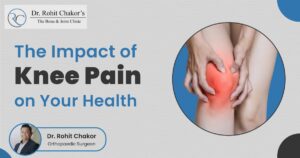Dr. Rohit Chakor a renowned Orthopedic Doctor in Kondhwa. In this article, we will delve into the topic of preventive measures for orthopedic health, focusing on the crucial aspects of exercise, diet, and lifestyle. By adopting these preventive measures, you can maintain strong bones, healthy joints, and reduce the risk of orthopedic conditions. Let’s explore the key strategies to ensure optimal orthopedic health.
Importance of Preventive Measures:
Prevention is always better than cure, and when it comes to orthopedic health, this adage holds true. By proactively taking care of your musculoskeletal system, you can minimize the chances of injuries, fractures, and degenerative conditions. Dr. Rohit Chakor, an esteemed orthopedic surgeon in Kondhwa, emphasizes the significance of adopting preventive measures to lead a healthy and active life.
Exercise for Orthopedic Health:
Regular exercise plays a vital role in strengthening muscles, enhancing flexibility, and maintaining bone density. Here are some key exercises that can promote orthopedic health:
Strength Training: Engage in weight-bearing exercises such as lifting weights or using resistance bands. These activities help build strong muscles, which support the joints and reduce the risk of injuries.
Aerobic Exercises: Activities like walking, swimming, cycling, or dancing improve cardiovascular fitness while putting minimal stress on the joints. Regular aerobic exercises promote overall health and maintain joint flexibility.
Stretching and Flexibility Exercises: Incorporate stretching exercises into your routine to enhance joint range of motion and prevent muscle stiffness. Yoga and Pilates are excellent options to improve flexibility.
Diet for Orthopedic Health:
A well-balanced diet plays a significant role in supporting bone health and preventing orthopedic conditions. Here are some essential nutrients and foods to include in your diet:
Calcium-Rich Foods: Dairy products, leafy green vegetables, fortified cereals, and tofu are excellent sources of calcium. Calcium is vital for maintaining strong bones and preventing osteoporosis.
Vitamin D: Ensure sufficient intake of vitamin D, either through sunlight exposure or dietary sources like fatty fish, egg yolks, and fortified dairy products. Vitamin D aids in calcium absorption and promotes bone health.
Omega-3 Fatty Acids: Incorporate sources of omega-3 fatty acids, such as fatty fish (salmon, mackerel), flaxseeds, chia seeds, and walnuts. These healthy fats have anti-inflammatory properties that can benefit joint health.
Antioxidant-Rich Foods: Include fruits and vegetables rich in antioxidants, such as berries, citrus fruits, broccoli, and spinach. Antioxidants help reduce inflammation and oxidative stress in the body.
Lifestyle Modifications: Certain lifestyle factors can have a profound impact on orthopedic health. Here are some valuable tips to consider:
Maintain a Healthy Weight: Excess body weight places undue stress on the joints, increasing the risk of orthopedic conditions. By maintaining a healthy weight through a balanced diet and regular exercise, you can alleviate strain on the joints and reduce the likelihood of developing joint-related problems.
Proper Posture and Body Mechanics: Practice good posture while sitting, standing, and lifting objects. Use ergonomically designed furniture and ensure correct body mechanics to prevent unnecessary strain on the musculoskeletal system.
Avoid Sedentary Habits: Prolonged sitting or a sedentary lifestyle can weaken muscles and increase the risk of orthopedic issues. Incorporate regular physical activity and take breaks from sitting to keep your muscles active and joints mobile.
Wear Appropriate Footwear: Choose comfortable, supportive footwear that fits properly. The right shoes provide cushioning and stability, reducing the risk of foot and ankle problems.
Prioritizing preventive measures for orthopedic health is paramount to leading an active and pain-free life. By following the advice of Dr. Rohit Chakor, an experienced orthopedic doctor in Kondhwa, you can take proactive steps towards maintaining strong bones, healthy joints, and overall musculoskeletal well-being. Incorporate regular exercise, a balanced diet, and healthy lifestyle habits into your routine to reduce the risk of orthopedic conditions and enjoy optimal orthopedic health. Remember, prevention is the key to a vibrant and active life!





